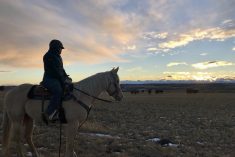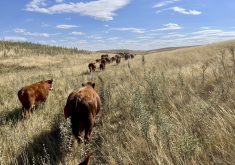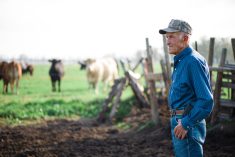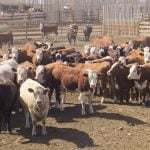On the second floor of the Queensbury Convention Centre at Agribition, the Grain Expo takes place every year. Around the edge of the room, booths are set up, surrounding the tables attendees sit at. Everyone sits watching the panel of producers walking onto the brightly lit stage.
Steve Sanden and his son, Josh Sanden, are sitting at the end of the stage, near the stairs. They own and operate West of 3rd Ranch near Craik, Sask. They are at the Grain Expo to speak about their succession plan.
Steve took over the operation from his father alongside his brother. Now, Josh Sanden is slowly starting to return to their farm. With his brother considering returning as well, he wants to ensure they have a succession plan.
Read Also
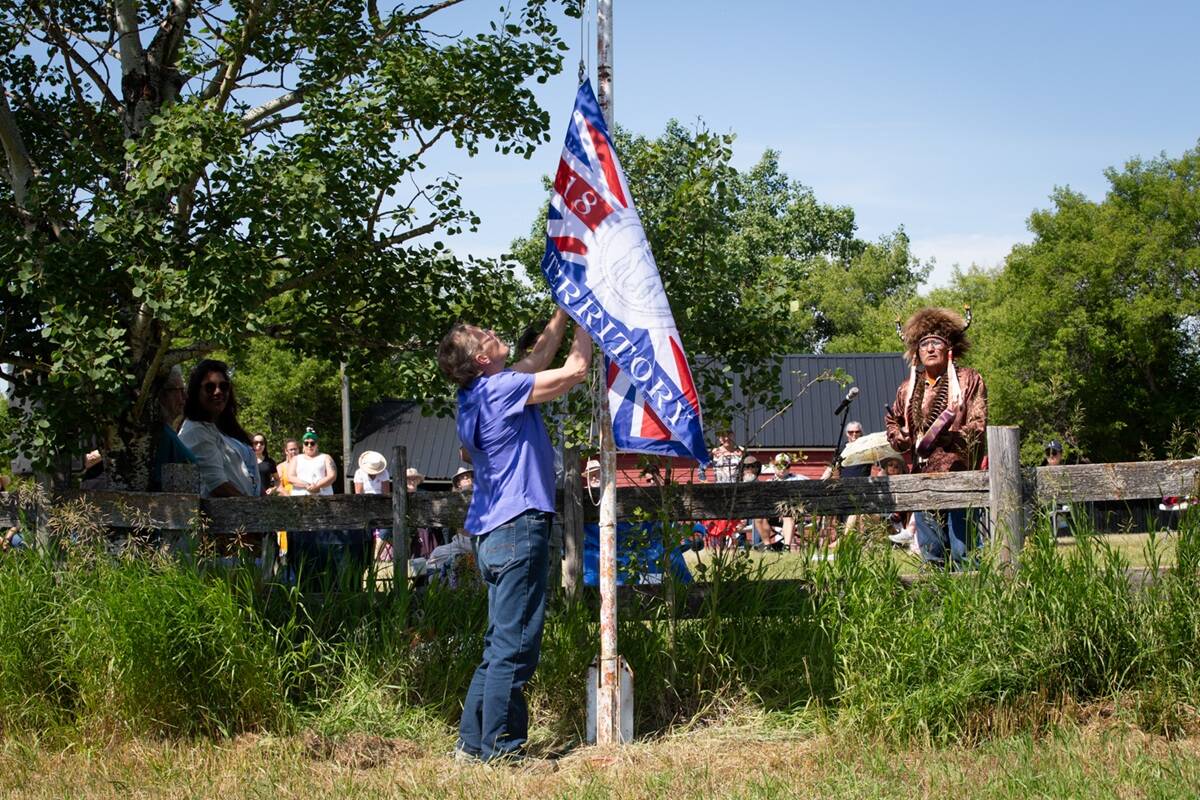
Treaty Land Sharing Network expands reach in Saskatchewan and Alberta
The Treaty Land Sharing Network, which connects land holders with First Nations and Metis people, has expanded since it began in 2018
“I think as a young guy, I’ve made the decision that that’s kind of the path I want to go down,” Sanden says.
“It’s kind of daunting, you know, you look at land values and all that stuff and every decision is long-term now. We’re talking how we’re going to spread it out over… decades versus maybe just trying to make it work that year.”
Succession plan shortage
According to a report released by RBC in April 2023, 66 per cent of Canadian producers don’t have a succession plan. The report also says by 2033, 40 per cent of producers will retire.
That leads to doubt about what will happen to Canadian farmland in the future and who will fill the gap of retiring farm operators. It also underlines the importance of having a succession plan.
[AUDIO] Trevor MacLean of MNP on the role of a professional when creating a family succession plan.
Elaine Froese is a farm family transition expert who coaches people on their succession plans — specifically, better communication and conflict resolution. She grew up on a cattle operation and is now part owner of Froese Family Farm.
When it comes to producers not having a succession plan, Froese gets straight to the point.
“Procrastination and conflict avoidance is killing agriculture,” Froese says. When she’s asked farm families in her audience why they’re not getting started on farm transition talks, “one of the first things they say is, ‘We’re too busy to plan.’ And another thing they will say is, ‘It’s too stressful because we don’t want to have conflict.’”
The emotional effect of succession planning makes producers put it off, as well.
“Many farmers don’t want to lose their identity as the main manager,” Froese says. “There’s a lot of emotion involved with change. And I think people are afraid of the emotional factors that affect their planning.”
She echoes RBC’s report about producers who are retiring, saying the main farm manager is often making transition plans too late in life.
“A lot of farmers don’t also pay attention to how old they are, because all of a sudden, they wake up and they’re not 21 anymore, they’re 70 years old… in your 60s, it’s about starting over or stepping back without stepping away.”
Trevor MacLean is an agricultural business advisor with MNP who works with producers on their succession plans.
He says producers likely don’t have a succession plan because they don’t know where to start. Succession planning is a huge undertaking that can be intimidating, he says.
“The family potentially may have issues that are prohibiting open, transparent communication on exactly where to start,” MacLean says.
Procrastination
When listening to the panel of producers at the Grain Expo talk about succession planning, it’s clear a formal succession plan was rare for previous generations.
[AUDIO] Trevor MacLean of MNP on the importance of formality when creating your succession plan.
Even now, many producers don’t think a formal succession plan is necessary, and an informal agreement is good enough.
However, MacLean emphasizes the importance of working on a formal succession plan. “I like to tell families that it’s never a good idea or outcome to manage from the grave.”
No matter what the farm includes — whether it’s a cattle ranch, grain farm, both or something else — there is an immense amount of wealth tied up in each family operation.
“You have to get ahead of it, and absolutely plan for it.”
Succession planning is a very complex and long process that is constantly changing. MacLean says sometimes people think it should be fair, but that can hinder the operation and the people involved.
“Often in farming operations, equal isn’t fair, because is the farm viable if you try to split it up two or three or four ways, and each try to be independent from the other? It typically doesn’t work that way,” MacLean says. “It’s great when Mom and Dad are around as the patriarch and matriarch of the family and can keep it together, but once they’re gone, splitting up a farm operation typically is not the best outcome for any legacy asset around agriculture.”
Advice
With so many farm operations without a succession plan, Froese and MacLean share advice on how producers can work on their succession plan.
Froese recommends producers figure out what they want before discussing the transition. “The first step before we even get to the table is to figure out what you personally want as the farmer. And secondly, what your spouse wants.
“Then, what is your future vision for the next chapter of your life? Because when I ask a farmer what he or she wants, sometimes they just say, ‘Oh, I never really thought about it.’ I say, ‘Well, we’re not really going anywhere,’ because you can’t move towards something unless it’s more exciting than what you’re leaving behind and letting go of.”
MacLean says producers need to sit down at the table and discuss what a succession plan looks like for their operation. This should include the generation currently operating the farm, the succeeding generation and any off-farm children.
He says a succession plan contains a multitude of different things, and all of those should be considered.
“You’re looking at the estate plan, you’re looking at the personal financial plan, you’re looking at a business plan, a continuity plan,” he says. “All of these plans come together through a sound transition process. So, yes, start the conversation, say, ‘Hey, where is everybody at with regards to this?’”
From there, timelines should be discussed and decided upon, as everyone in the family will be in different stages of their lives and have different opinions.
Then, he recommends working with professional organizations that deal with succession planning, such as MNP and Farm Credit Canada.
He says professionals can serve as mediators of sorts, as well.
“I often find that when I’m in the room, when I’m having the conversation with everybody one-on-one, that they’re more open to actually bringing up the topics that are potentially taboo, or in the past have raised the conflict in the family,” MacLean says. “But when it’s spoken to somebody like myself who is trained in family succession, there’s just that level of comfort.”
Next generation
Despite the data coming out of RBC’s report, Froese and Maclean believe there will be more succession plans put into place in the future. Froese says otherwise, family farm operations won’t be able to last.
[AUDIO] Trevor MacLean of MNP on what the next generation is looking for when it comes to a succession plan.
Maclean, on the other hand, believes the younger generation is more interested in having formal succession plans than the generations before them, and will continue to push for that.
“They don’t want to sit back and have Dad be 80 years old, and still not have a stake in what they’ve been working in and on their whole life,” MacLean says.
“That generation now doesn’t want to wait for forever. They want to be able to look at themselves every morning with pride and say, ‘Hey, this is mine,’ or ‘This is ours,’ with their family, and know what they’re working for and on.”
While Josh Sanden knows his father never had a formal succession plan when he took over the farm, he wants to shape a formal succession for himself, and to ensure farming is a possibility for his children.
“I had a son here two years ago,” he says while on the panel, looking out at the crowd. “And I just want to be able to give him the chance to be able to farm… it’s going to certainly be a challenge for me to ensure that happens. And I think myself and my brother, we see that the challenges are going to be quite different. So whereas Dad said his was relatively informal 30 years ago, I know that’s something I’m going to slowly start on working with professionals.”




